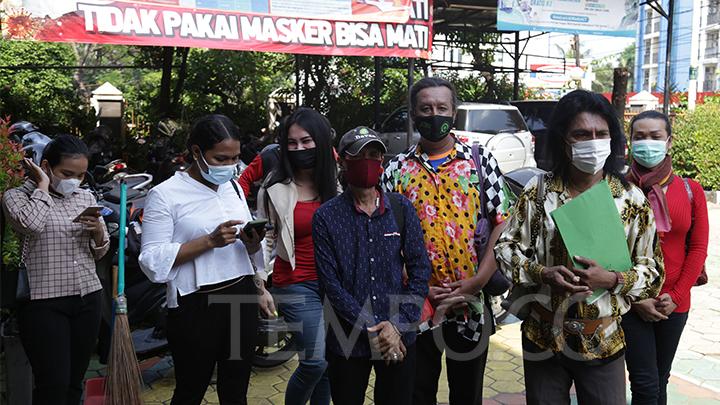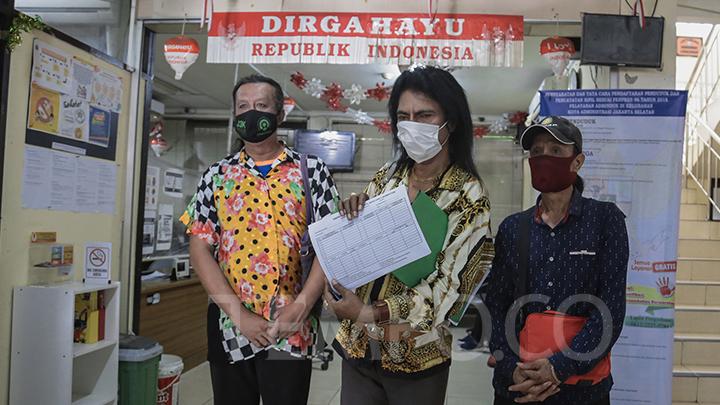Live Without Social Protection; Why Does it Hard for Transgender Women to Access Social Security
Translator
Non Koresponden
Editor
Laila Afifa
Senin, 26 September 2022 22:17 WIB

TEMPO.CO, Jakarta - The trans women group is not only excluded from political activities but it is also difficult for them to access the rights to obtain social security.
Bitter old memories are stuck in Ochan's head. Her peers made fun of Ochan’s different appearance. “Went to school wearing a skirt, friends, and teachers were mad at me. I changed it, but still put on lipstick,” said the trans woman from Liau, Ende, East Nusa Tenggara, on July 21.
It was not an easy decision for Ochan to dress femininely. The majority of the people in her village still cannot accept her situation. Some of her family members even forbade it. “I was even beaten by one of my family members who doesn’t like me to be a trans woman,” she recalled. “I feel comfortable as a trans woman. I ran away because I wasn't free at home.”
She still received bad treatment when she grew up. Some people cannot accept the trans women community in their environment. Ochan recalled that two years ago, several people blocked and kicked her when she was driving a motorcycle. They told her that they hated her appearance.
What worries her is that she practically has no protection against the people’s negative stigma toward trans women. “I thought about what if I get sick? What if I have no money? I also don’t have BPJS (social security insurance),” she said.
Ochan could not access the service of the national health insurance (BPJS Kesehatan) as she has yet to have an e-KTP (electronic ID card). The citizenship identity is the government requirement in providing services for Indonesian citizens.
She admitted that she often tries to register to apply for an ID card. But the old trauma keeps running through her head. “I’m afraid to be laughed at. Why does a woman have a masculine name? I’m afraid. I often go to the village head office wearing a shirt. I was on my way and then I went back home.”
She realizes that the fear will make it even harder for her to get recognition and social security access from the government. Even today she already feels it. “When I'm sick, I don’t go to the hospital, I only buy some medicines at the pharmacy because I don’t have BPJS insurance,” said Ochan.
Not only does she have no access to healthcare services and other social security, but Ochan also cannot access banking, cooperatives, or other financial services. Since she does not have a KTP, she also lost her right to vote in the 2019 general election.
Loka Pitaloka, a trans woman from Sikka, NTT (East Nusa Tenggara), also shares the same experience. She said that she does not have access to state healthcare services as she doesn’t have BPJS Kesehatan insurance. That’s also because she doesn’t have an ID card or KTP. As a result, Lola often takes out a loan to get healthcare treatment. “I borrow money, some would give it. If no one gives it, it’s super hard to get treatment,” she said.
The absence of healthcare and social security access makes the trans women situation even more difficult amid the pandemic period. A survey by Crisis Response Mechanism (CRM), a collective activity initiated by a number of gender equality activists during the pandemic, showed that 57.5 percent of the lesbian, gay, bisexual, transgender, and intersex (LGBTI) community did not receive Covid-19 assistance from the government.
The reasons are: in addition to the limited information, the discrimination against gender and sexual identity is still happening, as well as the absence of citizenship documents. In Yogyakarta, in July 2021, Waria Crisis Center announced that at least 11 trans women in Yogyakarta died at their boarding house due to limited access to medicine, healthcare service, and food.
For a trans woman, it is not easy to register for a KTP. Ochan in Ende is still traumatized by her childhood memory of being made fun of, making her afraid to face village officials. Jeny, a trans woman in Yogyakarta, who finally got her ID card in August 2021, went through a different experience when she registered her citizen document in Sleman in 2015, which was also faced by most transgenders.
Jeny for years had failed to apply for an ID card as she could not meet the requirement of the recommendation letter to change her domicile from her original residence in Subang, West Java. The problem was that it was nearly two decades since Jeny was ‘exiled’ by her family that denied her transformation as a trans woman. Requiring her to meet the recommendation letter to change her domicile meant that she was forced to go back home. “The officers didn't know that my family didn’t want to accept me anymore,” Jeny explained when met on Tuesday, August 30.
When she did not have an ID card, Jeny could not also register as a BPJS Kesehatan member. “It’s so hard when you’re sick,” she recalled. Jeny immediately applied to register for her BPJS Kesehatan membership when she finally got her KTP in August 2021.
Coordinator of Suara Kita, Hartoyo, said that it is not easy for trans women to access social security. The fact is that for many of the trans women who died, the burial process and funding depended on the joint venture from their community itself. “The limited access to healthcare services until the social assistance for trans women community is caused by their limited access to registering for an ID card,” said Hartoyo.
Suara Kita, an advocacy organization for LGBTQI equality, is now promoting a campaign of KTP for the trans women movement. Jeny in Yogyakarta finally obtained her ID card last year through this movement. But not many trans women are as fortunate as Jeny.
From June 2021 until today, Hartoyo said, only 647 trans women have an ID card or KTP, and only 61 have a BPJS Kesehatan membership. Suara Kita has yet to collect data on BPJS Kesehatan membership among the trans women group.
Hartoyo said that his organization has been working together with the focal points in several regions in Indonesia, namely in Greater Jakarta Area (Jabodetabek), Denpasar, Surabaya, Semarang, Yogyakarta, Bandung, and Serang, to advocate the trans women who need government services. “There are a total of 20 focal points that help,” he said. According to Hartoyo, his institution will continue to advocate for open access to the economy, social, and culture for lesbian, gay, bisexual, transgender, queer, and intersex groups.
The Public Relations head of BPJS Kesehatan, M. Iqbal Anas Ma’ruf, said that his institution works based on the regulation in processing the BPJS Kesehatan membership. “As long as you have KTP, you can have a BPJS membership. Because every Indonesian citizen has the same right to register themselves to BPJS Kesehatan,” he said.
Anas said that his office does not see the social status of the people who want to register a BPJS Kesehatan membership, including trans women or other marginal groups. BPJS Kesehatan, he went on, will serve anyone to get healthcare security from the state no matter what their sex is as long as they have an ID card.
The National Team for the Acceleration of Poverty Reduction (TNP2K) stated that citizenship identity will be the main basis for the government to provide assistance to the poor. Head of TNP2K Policy Team, Elan Satriawan, said that trans women in the poor category still have to have an ID card to obtain assistance from the government. This is because the government social assistance for the poor is based on the ID number (NIK). “To make sure there is only a single data,” he remarked.
TNP2K, he went on, does not have the data related to the trans women who have or have yet to get social assistance from the government. According to Elan, efforts to ensure that marginalized groups, such as trans women, receive government assistance, are fully under the charge of the Social Affairs Ministry and Home Affairs Ministry through the directorate general of Population and Civil Registration.
The Home Affairs Ministry’s director general of Population and Civil Registration, Zudan Arif Fakrulloh, said that his office has been trying to help the trans women group in obtaining an ID card since two years ago. He also has issued Circular letter number 470/9363/Dukcapil regarding Data Collection and Issuance of Administrative Documents for Transgender Residents.
Since the issuance of the letter, he went on, the directorate general has issued over 600 e-KTP for trans women in Indonesia. “We’re not going to reject the trans women who come to the Dukcapil (population and civil registration) office bringing along a complete document, or we can pick them,” he said. “We’ll definitely serve them.”
The problem is that several trans women consider that the requirement to register for an electronic ID card (e-KTP) is difficult. They find it hard to meet, such as a family card requirement. Trans women do not have a family card as they are outcasted by their families. “Meanwhile, a family card is a basic requirement to register for an electronic KTP,” he remarked.
***
The report on trans women and Indonesian politics was a collaboration between Koran Tempo and Jaring.id with the support from Indonesian Association for Media Development (PPMN) and The Asia-Pacific Regional Support for Elections and Political Transitions (RESPECT). This collaboration also involved the Philippines Center for Investigative Journalism (PCIJ) and Lafaek News (East Timor)
KORAN TEMPO
Click here to get the latest news updates from Tempo in Google News




















